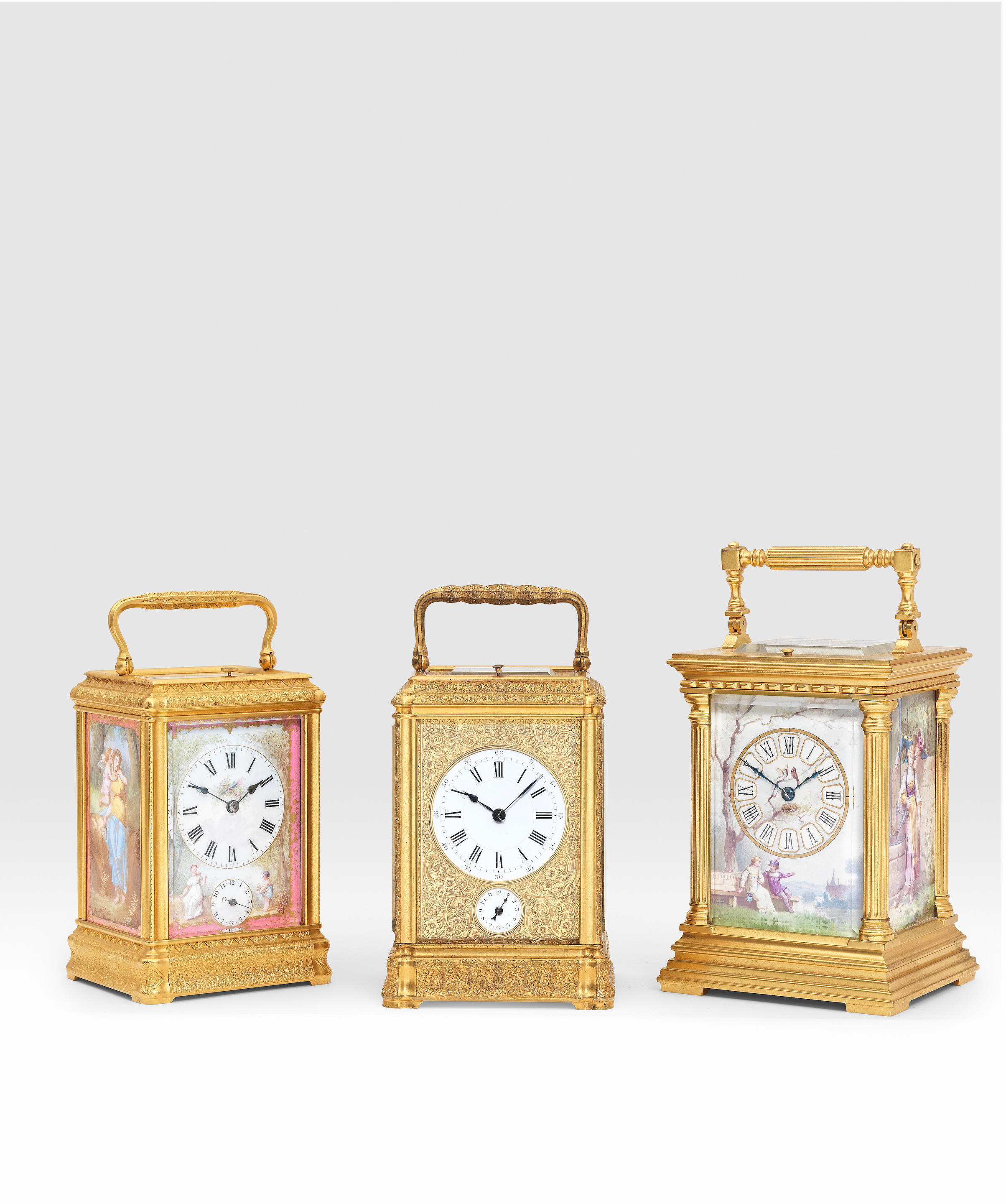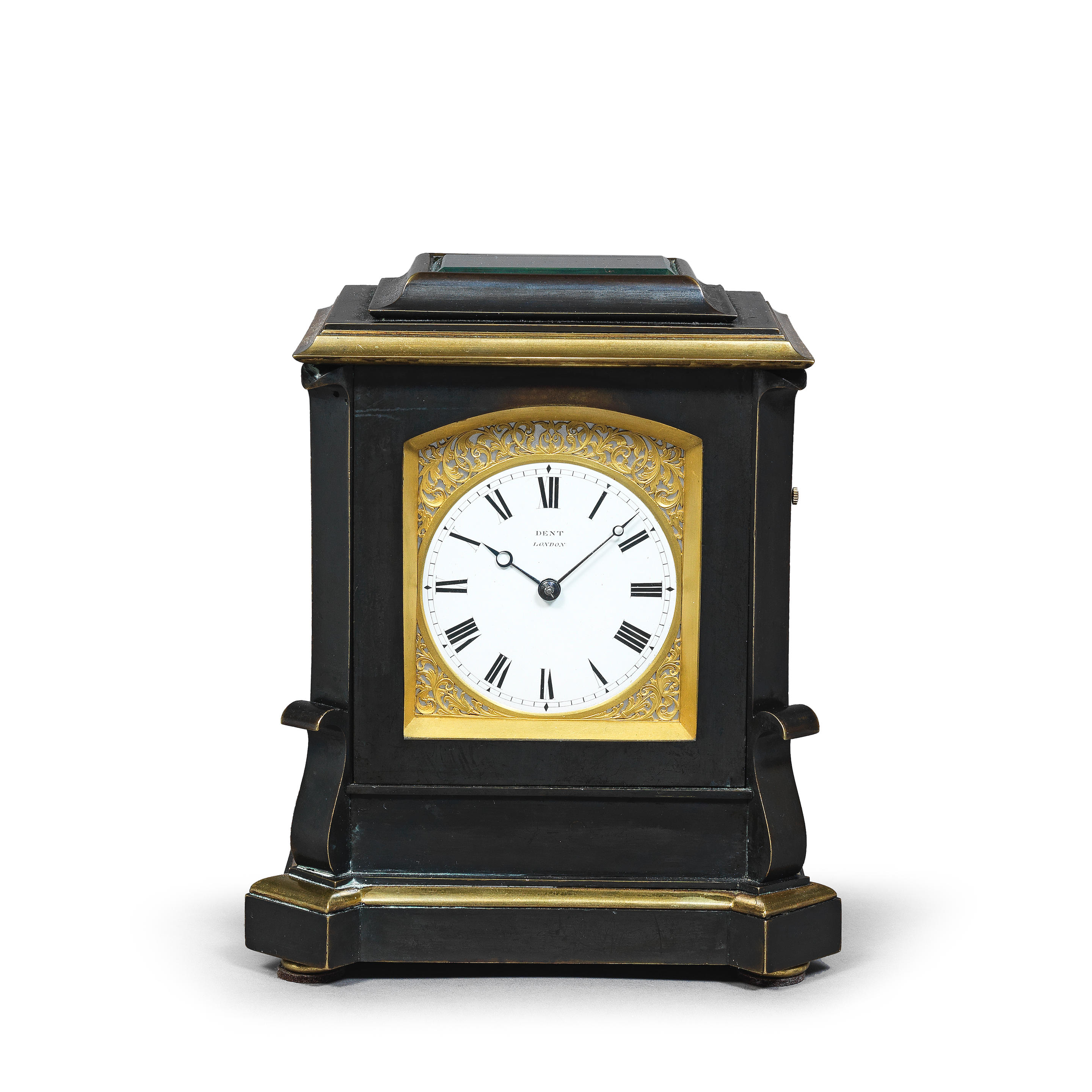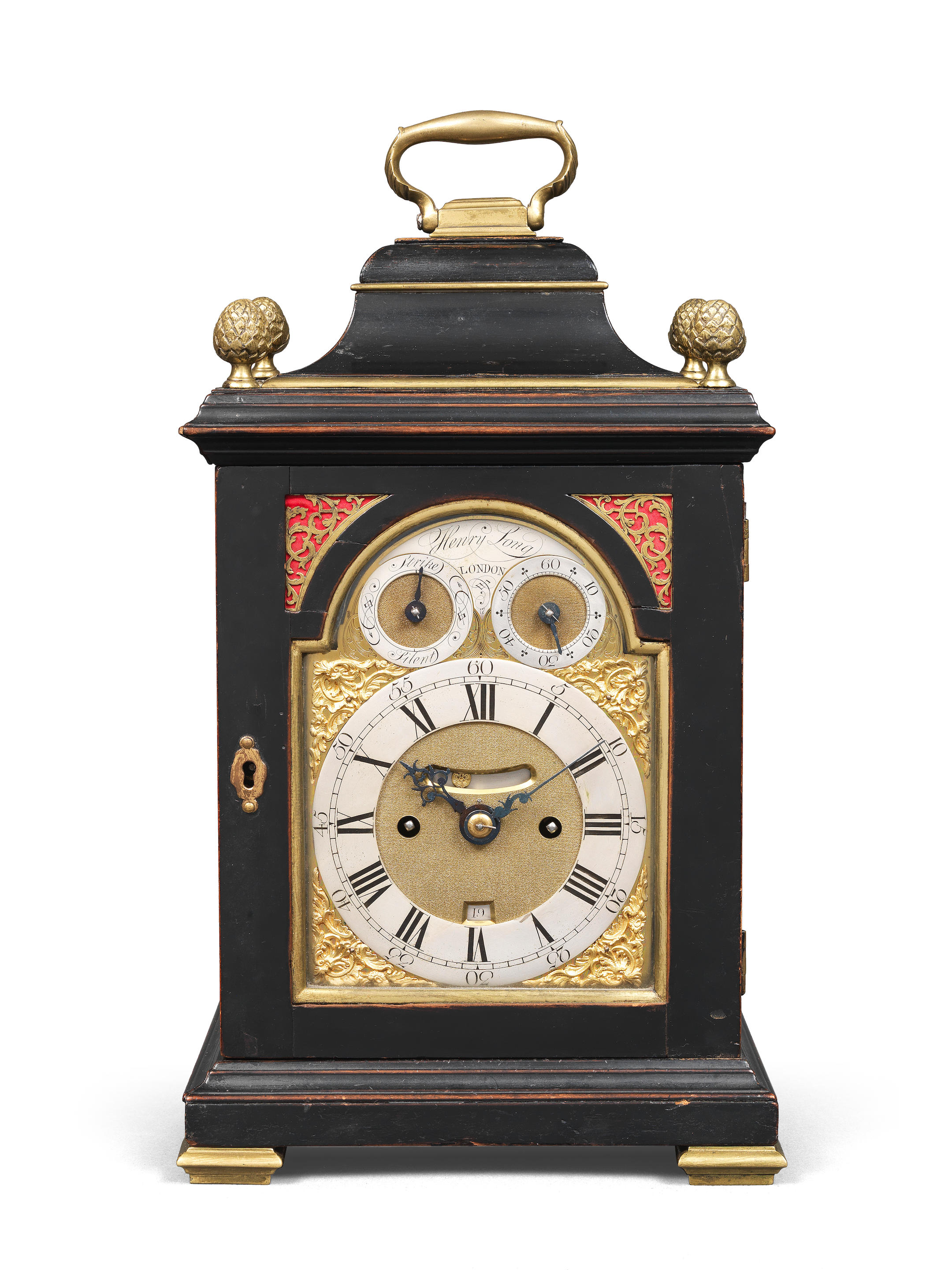A good and rare mid 19th Century English giant brass carriage clockJames McCabe, Royal Exchange, London, Number 2756 The gilt case surmounted by a substantial facetted handle with cast tied-leaves raised on fancy trunnions, and a heavy bevelled glass escapement observation window containing the repeat button, with stepped narrow cornice over three heavy bevelled glass panels and a solid rear door with shuttered apertures for slow/fast regulation, strike/silent, hand setting and winding, on a moulded plinth base with separately mounted curved block feet. The 4inch one-piece engraved silvered Roman dial decorated with elaborate acanthus leaves interspersed by small flowerheads, the plain Roman chapter ring with engraved centre and a large subsidiary seconds dial intersecting the number XII, with good, blued steel fleur des lys hands, reading against a fully engraved centre, signed in a shaped cartouche below VI, Jas McCabe Royal Exchange, London 2756. The twin chain fusee movement united by five tapering pillars, with maintaining power and large shaped frosted gilt platform carrying the plain monometallic balance over an underslung jewelled English lever escapement, rack striking on a blued steel gong set on a large block on the back plate. Together with an associated 19th century mahogany travel case with patinated brass handle and applied paper label CABIN/ P&O and SS Siml??, Ticking with an associated double-ended winding key. The clock 26.5cms (10.5ins) high. The case 30cms (12ins) high. (2)FootnotesJames McCabe was born in 1748 in Lurgan, 29 km south-west of Belfast, to Patrick McCabe, who was himself a clockmaker, responsible for erecting the Lurgan Parish clock 4 years earlier. In 1770, James moved to Belfast, possibly working out of his brother Thomas' shop, though they don't seem to have been business partners. Thomas McCabe was a horologist, a United Irishman and a prominent abolitionist; in 1786 he made a famous speech in Belfast condemning the evils of the slave trade, which meant that Belfast refused to participate in it. His son, William Putnam McCabe, was a political activist and one of the most legendary members of the United Irishmen, who was said to have had, at one time, 25 separate warrants for treason taken against him. He was once arrested near to Cornhill, London after his uncle had established himself as a horologist in that area. Five years after arriving in Belfast, James McCabe moved to London, first working in Fleet Street, then Cheapside, before settling in 97 Cornhill, Royal Exchange around 1804. He gained honorary freedom in 1781, becoming Warden of the Clockmakers Company in 1811, the year he died. The business was then taken over by three of his sons, James (born 1787), Thomas (born 1791), and Robert (born 1796). James (Jr.) had been apprenticed to Auld & Reid of Edinburgh between 1801-1808. It may seem odd that James was sent so far from London, but William Auld worked in Belfast, around the same time that James McCabe (Sr.) did, so it seems likely they developed a close friendship. James (Jr.) was admitted by Patrimony to the Clockmakers Company in 1822. It is difficult to determine what James did in the firm; whether the pieces after 1811 were signed James McCabe because they were made by James McCabe (Jr.) or because 'James McCabe' was a trusted and recognised name. The firm's name became 'James McCabe & Son' in 1815, previously having been simply 'James McCabe', though this was changed 4 years later to 'McCabe & Son'. Thomas McCabe seems to have been a watchmaker, though there is no evidence of any apprenticeship undertaken. He was admitted to the Clockmakers Company by Patrimony in 1815, entering the livery in 1819. It is uncertain how practical his contribution to the firm was. Certainly, his son, Henry Clifford McCabe, would describe himself as the manager of the firm in the 1850's. Robert McCabe appears to have pursued both clocks and watches and was admitted by Patrimony to the Clockmak
A good and rare mid 19th Century English giant brass carriage clockJames McCabe, Royal Exchange, London, Number 2756 The gilt case surmounted by a substantial facetted handle with cast tied-leaves raised on fancy trunnions, and a heavy bevelled glass escapement observation window containing the repeat button, with stepped narrow cornice over three heavy bevelled glass panels and a solid rear door with shuttered apertures for slow/fast regulation, strike/silent, hand setting and winding, on a moulded plinth base with separately mounted curved block feet. The 4inch one-piece engraved silvered Roman dial decorated with elaborate acanthus leaves interspersed by small flowerheads, the plain Roman chapter ring with engraved centre and a large subsidiary seconds dial intersecting the number XII, with good, blued steel fleur des lys hands, reading against a fully engraved centre, signed in a shaped cartouche below VI, Jas McCabe Royal Exchange, London 2756. The twin chain fusee movement united by five tapering pillars, with maintaining power and large shaped frosted gilt platform carrying the plain monometallic balance over an underslung jewelled English lever escapement, rack striking on a blued steel gong set on a large block on the back plate. Together with an associated 19th century mahogany travel case with patinated brass handle and applied paper label CABIN/ P&O and SS Siml??, Ticking with an associated double-ended winding key. The clock 26.5cms (10.5ins) high. The case 30cms (12ins) high. (2)FootnotesJames McCabe was born in 1748 in Lurgan, 29 km south-west of Belfast, to Patrick McCabe, who was himself a clockmaker, responsible for erecting the Lurgan Parish clock 4 years earlier. In 1770, James moved to Belfast, possibly working out of his brother Thomas' shop, though they don't seem to have been business partners. Thomas McCabe was a horologist, a United Irishman and a prominent abolitionist; in 1786 he made a famous speech in Belfast condemning the evils of the slave trade, which meant that Belfast refused to participate in it. His son, William Putnam McCabe, was a political activist and one of the most legendary members of the United Irishmen, who was said to have had, at one time, 25 separate warrants for treason taken against him. He was once arrested near to Cornhill, London after his uncle had established himself as a horologist in that area. Five years after arriving in Belfast, James McCabe moved to London, first working in Fleet Street, then Cheapside, before settling in 97 Cornhill, Royal Exchange around 1804. He gained honorary freedom in 1781, becoming Warden of the Clockmakers Company in 1811, the year he died. The business was then taken over by three of his sons, James (born 1787), Thomas (born 1791), and Robert (born 1796). James (Jr.) had been apprenticed to Auld & Reid of Edinburgh between 1801-1808. It may seem odd that James was sent so far from London, but William Auld worked in Belfast, around the same time that James McCabe (Sr.) did, so it seems likely they developed a close friendship. James (Jr.) was admitted by Patrimony to the Clockmakers Company in 1822. It is difficult to determine what James did in the firm; whether the pieces after 1811 were signed James McCabe because they were made by James McCabe (Jr.) or because 'James McCabe' was a trusted and recognised name. The firm's name became 'James McCabe & Son' in 1815, previously having been simply 'James McCabe', though this was changed 4 years later to 'McCabe & Son'. Thomas McCabe seems to have been a watchmaker, though there is no evidence of any apprenticeship undertaken. He was admitted to the Clockmakers Company by Patrimony in 1815, entering the livery in 1819. It is uncertain how practical his contribution to the firm was. Certainly, his son, Henry Clifford McCabe, would describe himself as the manager of the firm in the 1850's. Robert McCabe appears to have pursued both clocks and watches and was admitted by Patrimony to the Clockmak














Try LotSearch and its premium features for 7 days - without any costs!
Be notified automatically about new items in upcoming auctions.
Create an alert